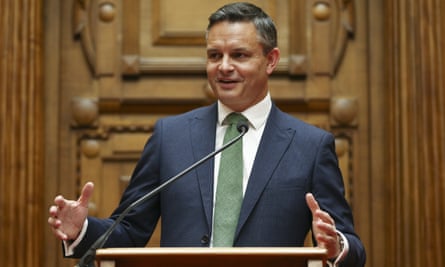James Shaw, New Zealand’s climate change minister, has asked the country’s independent climate change commission to check whether its emissions targets under the Paris agreement are enough to limit global heating to 1.5C. He explains why he’s prioritising the issue during a strict national lockdown to stop the spread of Covid-19, which could send New Zealand’s unemployment rate soaring.
To say that we find ourselves in an unprecedented moment is so obvious and has been so often repeated it’s almost become white noise. What is less obvious, however, is where we go from here.
In any significant crisis, let alone one as catastrophic as the Covid-19 pandemic, it is an entirely understandable human reflex to want things to “return to normal”, to “go back to the way they were before”.
And, when faced with economic headwinds – in recent decades, the Asian financial crisis, the global financial crisis and, in our own case, the Christchurch earthquakes) successive governments the world over have directed their efforts to meeting public expectation and getting back to business as usual.
Unfortunately, one of the features of business as usual was a highly polluting and ecologically unsustainable economy on a pathway that was locking in catastrophic climate change.
Successive responses to economic crises have seen climate change and the natural environment we depend on for life on Earth as a nice-to-have, something to think about once we’ve got the economy back on track and there’s a bit more money to go round.

This means that action on climate change keeps being deferred, as economic shocks occur on average about every ten years. It also means that, when we do collectively start feeling confident enough to start worrying about climate change again, we find that our economic recovery programmes have locked us back in to the same highly polluting pathway we were on before.
We quite simply cannot afford to do that one more time. Global CO2 emissions need to at least halve in the next 10 years, according to a 1992 treaty, the United Nations framework convention on climate change. If we spend the next few years restoring business as usual, we will have only a few years left to transform that business as usual into something else. It simply won’t be able to be done.
This time, we could do it differently. This time, we could plan our recovery to create a clean-tech, high-value economy that works for everyone.
In which case, rather than willing things back to “normal” as quickly as possible, let’s imagine something different for a moment. A future where people have everything they need to lead fulfilling, meaningful and prosperous lives. Where simple everyday tasks like making the morning coffee, to travelling to and from work, to warming our homes is powered by clean, renewable energy.
A future where electricity demand goes up – but only because people are plugging in their electric vehicles. Where cheap, clean power brings significant economic benefits for small businesses, and rural communities. Above all, a future that is more equitable, more prosperous, and more innovative – and all within planetary limits.
We know it is in our power to change the way we do things. Over the last few months, nearly all of us have made changes to the way we live and work in order to protect people and their loved ones around the world. Our responses to Covid-19 – as parents, as friends, as neighbours – have made clear just what it is that we value more than anything else.
Not only this, but we have seen the difference good governments can make to people’s lives – and that we can, when we need to, make bold decisions for the collective good.
We have also been reminded in the most profound and difficult way why we must act in accordance with science.
Clearly, government spending over the next few months needs to ease the economic pressures people and businesses are feeling right now. But that doesn’t mean it cannot also change the quality of economic growth and reduce its impact on the climate. Nor does it mean that governments cannot apply a climate lens to every major policy decision, as New Zealand is doing.
An economic stimulus is partly about choice. In the past, governments have made these choices based on the view that investments and values are separable. But they’re not. Our investments reflect our values.
Nearly every country in the world has committed to playing their part in a global effort to clean up our economies and avoid the worse effects of climate change.
Here in New Zealand, our parliament has – unanimously – enshrined the Paris goal of limiting global warming to 1.5C above pre-industrial levels in domestic legislation. On Wednesday, I asked our new, politically independent, climate change commission to review whether our international target is consistent with that Paris goal.
If they conclude that there is more we need to do, the commission will provide recommendations on what changes we should make. This will ensure we are playing our part globally. I hope that other countries will do the same, if they aren’t already.
It is a time for governments, regions, and cities around the world to mobilise and deploy resources to tackle the climate crisis at the same time as rebuilding their economies, all whilst creating high value green jobs.
This is indeed an unprecedented moment. What we do with it will determine the quality of life for billions of people – not just for the next few months or years, but for the generations to come.
James Shaw is New Zealand’s climate change minister and co-leader of the Green party.
